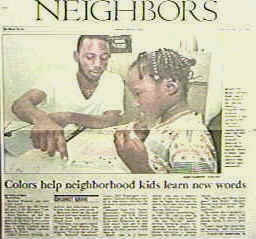



MIAMI
HERALD Breanna Williams sees color in her words. Nearly every day, the 6-year-old goes to the Barnyard Community Center
after Since October, she and the other neighborhood kids who gather at the West Called Tailored Reading, the method uses color-coded cards to help kids
learn Barnyard tutors use the cards to teach kids new words by associating them
with ``For them, it is a game matching colors,'' said Melissa Diaz, 23, one of
the four The Barnyard Community Center, 3870 Washington Ave., started Tailored Students from F.S. Tucker Elementary, Coconut Grove Elementary and G.W. Reiter, who is a former teacher and has a master's degree in learning
disabilities, ``I had trouble remembering,'' he said. ``So I had to come up with
something to He says ``at-risk'' readers develop increasing trouble recognizing words, phonics or vocabulary as soon as they start formal instruction -- making reading very difficult and frustrating. ``By finding and filling those gaps,'' said Reiter, ``children become
motivated to The system also is designed to be fun and, even after a full school day,
kids ``I don't think they know they are learning,'' said 26-year-old Kevrette
Wells, The Barnyard has about 130 students, each of whom has been tested to measure their reading skills. Kids who need special help are put into Reiter's program. ``About 26 children are in this reading program,'' said Ellen Collesano, coordinator of special programs at the Barnyard. The Tailored Reading program costs about $15,000 a year to run, and it's
made ``We just ran out of money and we can't pay any salaries anymore,'' said Collesano says the private grants were renewed and the reading program will start getting financial support in September -- so the Barnyard will be able to provide Tailored Reading for another year. Reiter's goal is to make his program available to other agencies and is in
the The program, he says, is very easy to duplicate, so he is willing to train
parents, There is another step to Reiter's program -- one designed to work against violence or drugs. Once kids have mastered at least 12 words, they are given ``Partner
Plays'' to For some parents, this program seems to be a miracle. ``She is very happy at the Barnyard,'' said Renita Samuel, talking about
her |